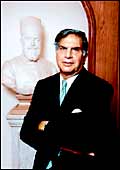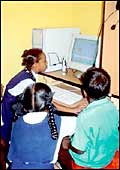 |
Thinking woman's philanthropy:
Rohini Nilekani with some of the beneficiaries of the
microfinance initiative Sanghamitra, of which she
is a part |
 |
| Educating educators: With
a grant of Rs 660 crore from Azim Premji, his eponymous foundation
has been working to enhance the quality of school education
across India |
One
day in late 2005, Rohini Nilekani, signed a cheque for Rs 100
crore in favour of Arghyam Trust-the name is Sanskrit for offering
and is also the name of the Nilekanis residence in Bangalore's
tony Koramangala area-which she had founded in 2001. The money,
which came from the sale of her shares in Infosys Technologies
(founded by husband Nandan Nilekani and six others in 1981) isn't
important. Nilekani's progression from student-activist to journalist-activist
to a woman of independent means (and how!; at last count, her
1.67 per cent stake in Infosys was worth Rs 768 crore) willing
to invest serious time and effort in understanding that philanthropy
thing is. "How can individuals and companies make up for
governmental failure?" asks Nilekani. "How can you take
your money and direct it at the good people (and organisations
doing good work)?" "How do we take our understanding
of corporate management practices and accountability into the
space?"
The questions are important because others,
across India, some in charge of the philanthropic activities of
companies, others in charge of the trusts and the foundations
created by companies to carry out philanthropic work, and still
others, wealthy individuals who would like to see their money
put to good use, are asking them too. And the questions are important
because they indicate the growing realisation that charity (broadly,
addressing symptoms) is as different from philanthropy (addressing
the underlying causes) as 20-20 cricket is from the five-day version
of the game. "There is no long term vision (in philanthropic
initiatives undertaken by companies or by individuals in India),"
says Pushpa Sunder, formerly Executive Director, Indian Centre
for Philanthropy. "There is lots of charity in India; little
philanthropy."
That this is changing is evident from the
way companies and business groups, such as the AV Birla Group
approach philanthropy today. "This centre is the apex body
for all our development projects," says Rajashree Birla,
Chairperson, Aditya Birla Centre for Community Initiatives and
Rural Development. "It sets strategies, and monitors and
ensures implementation and results." That sounds like serious
business. It is, for the 250 people who work for the centre.
THE GIVERS
Company/ Foundation/Trust/Others |
Thermax/ Direct
Corpus/Amount given away in 2005-06: N.A./1 per cent of
PAT (Rs 1.23 crore)
Focus area: Education, but not limited to that
Nicholas Piramal/ Gopikrishna
Piramal Trust and Diya Foundation (run by promoting family)/Direct
Corpus/Amount given away in 2005-06: N.A./Rs 1.2 crore
ICICI Bank/ ICICIcommunities, Social Initiatives
Group
Corpus/Amount given away in 2005-06: N.A.
Focus area: Elementary education and universal access
to financial services but not limited to that
Raymond/ Gram Vikas Yojana
(and several trusts run by the promoting family)
Corpus/Amount given away in 2005-06: N.A.
Focus area: Malnutrition and rehabilitation of street
children but not limited to that
AV Birla Group/ Aditya Birla
Centre for Community Initiatives and Rural Development
Corpus/Amount given away in 2005-06: Rs 90 crore
Focus area: Social and economic development of communities
Tata Group/ Sir Dorab Tata
Trust and other trusts/ Direct (by 40 major companies
in the group)
Corpus/Amount given away in 2005-06: N.A./Rs 590.22
crore
Focus area: From AIDS to ecology to community development
M&M/ KC Mahindra Trust/Direct
Corpus/Amount given away in 2005-06: Rs 19.24 crore
Focus area: Education and health
Dr Reddy's Labs/ Dr Reddy's
Foundation
Corpus/Amount given away in 2005-06: N.A.
Focus area: Education, livelihood and community development
Bharti Enterprises/ Bharti
Foundation
Corpus/Amount given away in 2005-06: Rs 200 crore/N.A.
Focus area: Primary education in rural areas but
not limited to that
Infosys/ Infosys Foundation
Corpus/Amount given away in 2005-06: 1 per cent of PAT
(N.A.)/Rs 13.25 crore
Focus area: Healthcare, social upliftment, art &
culture, education
ITC/ Direct
Corpus/Amount given away in 2005-06: Rs 56 crore
in 2004-05
Focus area: Rural and agricultural development
Godrej Group/ Phirojsha Godrej
Foundation/Direct
Corpus/Amount given away in 2005-06: Rs 5-8 crore
Focus area: Environment and conservation but not
limited to these
HLL/ Direct
Corpus/Amount given away in 2005-06: Rs 24 crore in
2004
Focus area: Health, empowerment of women, education
of special children
This is a representative table and does
not claim to include details of significant philanthropic
spends by India Inc as a whole.
|
The Measure Of Goodness
 |
| A helping hand: Vijaypat
Singhania with one of the street-children being trained at
the Raymond centre that focusses on their rehabilitation |
The transition from charity to philanthropy
has been helped along by a desire, on the part of companies and
individuals, to see results. "Thanks to the donors there
is a lot of emphasis on financial accountability," says Nilekani
who is Chairperson, Arghyam Trust, Akshara Foundation and Pratham
Books, and also involved with microfinance organisation Sanghamitra,
Public Health Foundation of India (PHFI), a public-private partnership
aimed at improving the quality of public health services in India,
and atree, an organisation that aims to protect bio-diversity
and promote sustainable development.
 |
| Organised from the start: Ratan
Tata's Tata Group spends more than any other Indian business
group on philanthropic activities |
And it has also been helped, in part, by a
desire to give back to society. "With the influence of television
and mass media, how long will the poor patiently and passively
wait for their lives to improve?" asks Anu Aga, Director,
Thermax. "It is vulgar to give more (to the family, which
already has lots of money)," adds K. Anji Reddy, Chairman,
Dr Reddy's Labs, explaining why his holding (valued at Rs 1,000
crore; the holding of the family as a whole is valued at around
Rs 2,500 crore) in the company will find its way to institutions
and foundations engaged in philanthropic or educational activities.
"Look at the Birla Institute of Technology and Science,"
he says. "Today, it is sitting on Rs 1,500 crore worth of
Grasim shares."
 |
| Not cheque-book philanthropy:
Rajashree Birla heads a 250-member team that gets down
to the details of developmental initiatives |
In some cases, efforts to do it the right
way start as early as identifying the problem. "We first
understand gaps in India's human development through the use of
research and then partner with the government and existing organisations,"
says Nachiket Mor, Deputy Managing Director, ICICI Bank, who is
also in charge of the bank's development initiatives. "If
necessary, we help create new organisations to fill the gap."
Where It Matters Most
In a country where several "development-gaps"
exist, corporate houses and individuals can find an avenue for
their philanthropic activities. "India is a very fertile
place to engage with the non-profit sector," says Nilekani.
For the av Birla Group, for instance, the main focus areas are
agriculture and the empowerment of women. One initiative involves
the optimum use of land and water resources by raising the ground
water table, harnessing available resources, recharging ground
water, installing pedal pumps, and erecting bunds. "This
project has ensured that 15,000 acres of land have come under
irrigation in over 400 villages, benefiting 12,000 families,"
says Birla. For the Mahindra Group, one of the focus areas is
education. The group sponsors the education of some 6,000 disadvantaged
girl children and, according to Rajeev Dubey, President, Human
Resources and member of the management board, recently "doubled
the number of Mahindra All India Talent Scholarships to 600 (this
is offered to students wishing to enroll in job-oriented diploma
courses in polytehnics)." Another is health; this year, the
group has decided to donate 60 cochlear implants over three years
to children under the age of five (each procedure costs around
Rs 5 lakh). Dr Reddy's Laboratories' emphasis is on creating livelihoods
and the Dr Reddy's Foundation's Livelihood Advancement Business
School has thus far created livelihoods for over 60,000 young
people from economically disadvantaged backgrounds.
THE IDEAL MODEL?
The Azim Premji Foundation is run like
a company. |
 |
| Wired and how: Kids
in Eluru in Andhra Pradesh are among thousands benefiting
from Wipro's work |
At the best of times, Wipro's
chairman Azim Premji is an intensely private person who prefers
to talk (after a great deal of persuasion) on his company
and little else. He declined to meet with this magazine to
discuss his take on philanthropy, instead deflecting queries
to Dileep Ranjekar, CEO of the Azim Premji Foundation and
Wipro's former HR head.
The foundation, which began its efforts to enhance the
quality of education in schools around the country (largely
in rural areas) five years ago with a Rs 360 crore grant
and three employees, today covers nearly 15,000 schools,
25,000 children and around 43,000 teachers and has recently
won more backing from Premji in the form of a fresh Rs 300
crore grant (it currently employs 250). The foundation has
tried to play a collaborative role, focussing on enhancing
the quality, quantity, and equity of education delivered
in government schools across the country, which account
for 90 per cent of the school-going students. "Education
is today based mostly on rote and memorisation of text and
there is little emphasis on understanding and comprehension,"
says Ranjekar. The last board meeting held in mid-July at
the foundation's office, located in a eucalyptus grove behind
Wipro's Corporate Office on Sarjapur Road, saw Premji and
Ranjekar make a five-year analysis of APF's progress.
"The last five years were a time of learning and
development and the time had now come to take this initative
forward," says Ranjekar. While his team has made siginificant
progress in reaching schools in 17 states in the country,
Premji believes it is time to create a collaborative framework
with other education partners. "While we have taken
our first few steps, (one initiative called Computer-Aided
Learning has grown from a single-school project to cover
over 15,000 schools today) , the statistics in education
(only 17 per cent of all girls in the arid, backward district
of Raichur in North Karnataka graduate, for instance) reveal
that we have a long way to go," explains Ranjekar.
Backed by the Premjis (Wipro chairman's wife Yasmeen is
a board member too), APF is now looking to "work on
concrete issues that can trigger systemic change in the
education sector."
-Rahul Sachitanand
|
At the Tata Group, apart from philanthropic
initiatives undertaken by affiliated trusts, most large companies
have philanthropic agendas, although some of these have more to
do with corporate social responsibility (CSR) than philanthropy.
Software services major TCS, for instance, runs an adult-literacy
programme that has benefited 46,000 people. Tata Chemical's water-management
programme has improved the lives of thousands of distressed villagers
in Gujarat's Okhamandal region. "Besides health, education,
and community development, in recent years, the emphasis has been
on developing sustainable livelihoods and encouraging social entrepreneurship,"
explains Anant Nadkarni, Vice President, CSR, Tata Group. Wipro's
Azim Premji has decided that the eponymous foundation he funds
will focus on education (see The Ideal Model?). And Nilekani has
chosen to focus her activities on the fact that most Indians lack
access to essentials: health, education, water, even markets.
 |
| Rs 217 crore: Or most of
the proceeds from selling his stakes in Future Soft and Hughes
Software; that's how much K.V. Ramani gave away |
The Personal Equation
The benchmark for philanthropic activities
in India would have to be technology entrepreneur K.V. Ramani
(significantly, all the individual philanthropists featured here
including Reddy and Premji owe their fortunes to the high market
value of their new-economy ventures). The co-founder of Hughes
Software Systems and Future Software sold his stake in both to
Flextronics in late 2004. His total income from the sale: more
than Rs 217 crore. He kept just around Rs 15 crore and gave away
the rest to a philanthropic trust Shirdi Sai Trust, he founded
in 1994 (by 2004, he had already given Rs 24 crore to this). Ramani
is busy making sure the interest generated is used for religious,
educational and medical purposes, and while his effort fits more
under the head of charity than philanthropy, the sheer (relative)
magnitude of it is something India Inc, and its residents would
do well to learn from.
Nilekani, in some ways, has done one better:
the amount she has given away is significant, and she has clear
ideas on what she calls "strategic philanthropy." "You
have to look at issues from a macro-level," she says. "Everything
is deeply connected." And she goes on to explain how access
to credit and access to water are closely related (Arghyam works
in the area of water security). "Cheque-writing is easy,
but I don't do that," she adds. "Our group has never
believed in cheque-book philanthropy," says Birla. Evidently,
India Inc. is learning on this front too.
-additional reporting by
Aman Malik, Rahul Sachitanand, E. Kumar Sharma and Nitya Varadarajan
|











